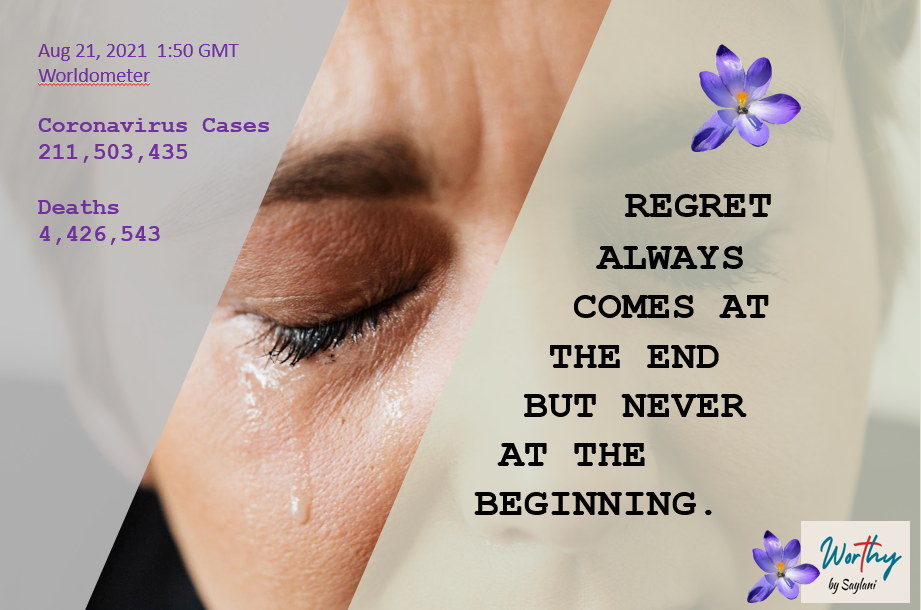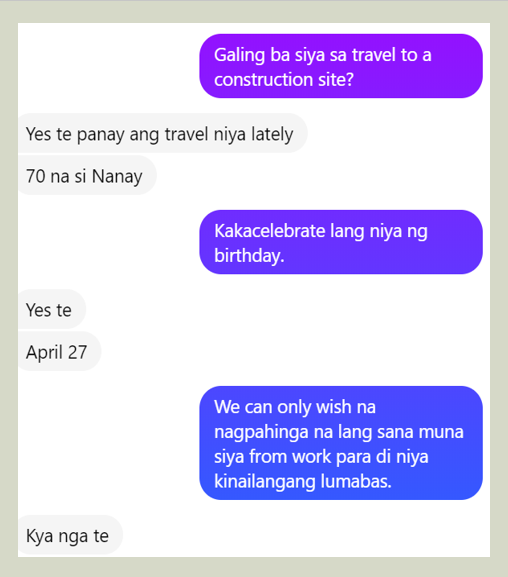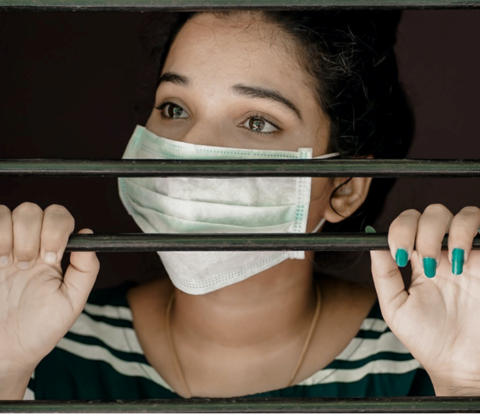We can help end the COVID-19 pandemic by learning more about it and taking the necessary actions. We can end this pandemic if we all do our part and put our trust and hope in God.
This topic might be ambitious, but we need to learn more about it at this time. Two mothers of friends died last Tuesday, August 17, while two friends’ families are battling COVID-19. It is a reality now that we have to face strongly.
Help end the COVID-19: Learn more about it
HISTORY OF COVID-19
According to WHO, SARS-CoV-2 is the new coronavirus that causes the disease identified as COVID-19. To reiterate, SARS-CoV-2 is the virus while COVID-19 is the disease.
Scientists suspected that SARS-CoV-2 started from bats as that’s how MERS-CoV (2012) and SARS-CoV (2003) started.
SARS-CoV-2 transferred to humans in a Wuhan wet market in China. However, it turned out that during the outbreak, the Wuhan market was not selling bats. Thus, the suspicion also fell on pangolins since some coronaviruses infecting pangolins are similar to SARS-CoV-2.
When WHO received a report of 27 cases of pneumonia in China on December 31, 2019, the cause was unknown. On January 7, 2020, a new coronavirus was identified as the cause. It was a new virus, so no one had immunity to the virus.
As we know now, the new virus has spread from China to the rest of the world through human-to-human transmission. This new virus was later named as SARS-CoV-2. COVID-19, the disease caused by SARS-CoV-2, was declared a global pandemic by WHO in March 2020. Since then, the pandemic has continuously spread, especially with the new variants of the virus.
No one can predict when this pandemic will end. Nevertheless, everyone should learn how to help prevent, slow down, and end this pandemic.
Nature of SARS-CoV-2: How, where, and when it spreads
SARS-CoV-2, the COVID-19 virus, is transferred from person to person in this possible series:
- An infected person talks, sneezes, or coughs producing droplets of saliva or discharge from the nose.
- Another person inhales the droplets that are still in the air.
- The droplets or discharge land on materials like clothes, utensils, furniture, etc.
- Another person touches those materials which have the droplets with the virus.
- This other person touches his nose, eyes, and mouth where the virus can enter the body.
Therefore, the settings where transmission usually happens are
- Crowded places
- Close contact situations
- Confined spaces with poor ventilation
The incubation period (from getting infected to seeing some symptoms) may extend from 5 days to 14 days. However, there have been rare cases that the symptoms have appeared after 14 days.
According to the Nature website, “severe disease usually develops ~8 days after symptom onset. On the other hand, critical disease and death occur at ~16 days.”
Here’s what I have gathered from the CDC website:
- With the Delta variant of SARS-CoV-2, a reversal of the downward trajectory of cases has happened. When the number of cases was supposed to go down, it went up because the Delta variant is more infectious. It is more than 2x more infectious than the other variants leading to increased transmission even in vaccinated individuals.
- The Delta variant can lead to more severe cases leading to hospitalization.
- Fully vaccinated people infected with the Delta variant can also spread the virus to others. However, they are infectious for a shorter period than the unvaccinated but equally infected with Delta.
- Lastly, the VIRUS IS MORE CONTAGIOUS “2 to 3 DAYS BEFORE SYMPTOMS START.” On the other hand, it is THE “MOST CONTAGIOUS 1 to 2 DAYS BEFORE” THE INFECTED PERSON FEELS SICK.
Nature COVID-19: What its symptoms are
SARS-CoV-2 is short for Severe Acute Respiratory Syndrome CoronaVirus 2.
Many infections with young people are asymptomatic (with no symptoms), while with older people can be severe. As the name suggests, the main effect is on the respiratory system. However, there were some cases where the heart and other organs were also affected.
The typical symptoms of COVID-19 are
- fever
- dry cough,
- and fatigue.
Other symptoms are
- loss of taste or smell,
- nasal congestion,
- runny nose,
- conjunctivitis (also known as red eyes)
- sore throat,
- headache,
- muscle or joint pain,
- different types of skin rash,
- nausea or vomiting,
- diarrhea,
- and chills or dizziness.
Symptoms of severe COVID‐19 are
- loss of appetite,
- confusion,
- shortness of breath,
- difficult or labored breathing,
- persistent pain or pressure in the chest,
- and high temperature (above 38 °C).
Other less common symptoms are
- irritability,
- confusion,
- reduced consciousness (sometimes associated with seizures),
- anxiety,
- depression,
- sleep disorders,
- and more severe and rare neurological complications such as strokes, brain inflammation, delirium, and nerve damage.
IMPORTANT!
If experiencing fever, cough, breathing difficulty, chest pain, and loss of speech or movement, seek medical help immediately. If you have a health care provider, call them first for direction to the right clinic or hospital.
The Impact of the Pandemic
The most significant impacts of the COVID-19 pandemic are the loss of lives and income. These losses lead to poverty for tens of millions of people.
As everyone is aware, the loss of lives is happening dramatically worldwide. As of August 19, 2021, 4,405,571 people have died out of 210,107,204 affected. On the 5th of September, 4,581,218 have died out of 221,513,567. Although vaccines have been available, it remains unclear when the pandemic will end. There are still 18,927,916 (Sep 5) active cases and new variants which continue to infect more.
The severity of this pandemic has led governments to execute lockdowns and quarantines that closed down businesses. Thus, not only business owners lose income, but everyone working or connected with those businesses.
Consequently, governments have to give financial support to those affected, while taxes collected are also down with few businesses operating.
Moreover, families with relatives brought to the hospitals because of COVID-19 have to pay humongous amounts of hospital bills. It becomes worse when the head of the family or the breadwinner in the family dies.
Staying at home should have been the best solution. However, poverty leads many poor people to leave their homes to find some ways to earn money. As many poor people say, “We may not die of COVID-19, but we may die of hunger.” Then, as they go out, the chances for them to get infected increase.
Clearly, the longer the pandemic continues, the more depleted everyone’s resources are. As this happens, the threat of hunger or malnutrition, and more sicknesses and deaths, not only of COVID-19, increase.

Help end the COVID-19 pandemic: Take necessary actions
Best action: Staying at home
a. STAYING AT HOME is one of the best ways we can help. Avoid going out to places where there’d be other people.
Create productive activities for yourself and your family. Communicate with others online, play board games, and learn new skills available online. Learning new skills will help you become more ready when opportunities come. You can also watch movies through Netflix. If Christian, I suggest Pureflix (if available in your area) or go to Youtube. I’ve found The Chosen and Encourage TV channels as good ones and there are more good ones out there.
Minimum health standards and protocols
b. Follow the minimum health standards. Wear your face mask and face shield properly.
Double your face mask if you’re going to a place where there could be many people. Wash the washable; properly dispose of the disposables.
c. Follow social distancing of at least 2 meters away from others when in public places. When someone is behind you and is quite near, remind the other person. Reminding others is particularly important when walking on the street and queueing in supermarkets, markets, restaurants, transportation, and government offices.
d. Practice respiratory etiquette such as:
- coughing or sneezing away from people and into a flexed elbow or a tissue,
- discarding tissues properly,
- washing hands or using alcohol/sanitizer after sneezing or coughing,
- and not spitting anywhere.
e. Avoid visiting other homes. Similarly, avoid receiving guests. If you need to, but limit to one or two persons and meet in open air.
More than this, avoid partying or joining or holding events. Parties can become super-spreaders. Be vigilant and report others who throw parties. For reunions, birthdays, etc., do it online and creatively.
Following hygiene habits and decontaminating
f. Wash your hands frequently with soap and water for at least 20 seconds. Without soap and water, rub your hands and arms with alcohol-based sanitizer before and after touching anything. Hence, take alcohol with you. Don’t expect establishments to have sanitizers for you.
g. When outside, avoid touching things touched by others like counters, tables, ballpoint pens, chairs, groceries, furniture, trolleys, baskets, handrails, doorknobs, walls, etc. When entering doors in public places, push with your elbows or arm, or shoulder. Still, don’t forget to rub your elbow and arms with alcohol and wash them upon arrival at home.
h. When outside or upon arrival at home, avoid touching your face, nose, mouth, and eyes until after you’ve washed your hands and arms properly.
i. Take a disinfectant with you in public places. When entering the toilet cubicle, spray with disinfectant first before entering. Remember, a poorly ventilated and confined space is a place for transmission. The public toilet is one.
j. If you have to go out, take double precautions and decontaminate when you arrive home. As much as possible, take a bath and change clothes upon arrival at home. Who knows if the virus is on your hair or your clothes and bags? Decontaminating may be difficult, but this sacrifice will help save your family.
k. Decontaminate commonly touched surfaces in your homes. Leave outside the shoes and slippers you’ve worn outside.
l. Avoid unprotected contact with wild animals even in animal markets and products from such, especially uncooked meat.
Following quarantine rules
m. If you regularly go out, have a separate room where you can retire separately from other family members. Here’s how you can help yourself when you’re on quarantine.
n. Remember, the virus does not exempt anyone. Observe yourself. Even without symptoms, avoid close contact with family members until after you’re sure you haven’t caught the virus. We know of more cases hitting families, not just individuals.
o. If you are an OFW or a businessman returning home or coming to the Philippines, please follow quarantine rules; if possible, do beyond for the sake of our countrymen.
Please do not think that the rules are unfair. How else did the SARS-CoV-2 variants enter our country? Do the same if you’re traveling to another country. Take extra precautions for the sake of the country you are going in. This pandemic is a global problem and is a problem for every citizen of the world.
p. Keep your pets away from the public and even from yourself if you’ve come from outside. If you’re the one who has gone in contact with others outside of your home, it is your responsibility to keep your home safe from the virus which you may be carrying.
q. VACCINATED OR NOT, follow the above. Remember that THE VACCINE DOESN’T MAKE YOU OR ANYONE IMMUNE FROM THE VIRUS. The government intends the vaccine to reduce the severity of the disease if one gets the virus. You can still get the virus and be a spreader of the virus. VACCINES WILL NOT HELP END IF those vaccinated go around thinking they will not get COVID-19 and will not spread it to others.
Hence, do not be complacent. Complacency about everyone’s vulnerability to the virus contributes to the continuation of the spread of the virus.
Finding solutions to financial problems
r. This may be difficult, but if you’re not a front-liner or in the essential sector, try to find other options of earning money without having to leave your house.
Options can be online. As I mentioned above, learn new skills that will be helpful in getting online jobs or doing online business.
If you can rest from working outside for a while, do it.
I admire what one family did (as shown in Jessica Soho’s KMJS) who lost businesses and decided to stay on a farm raising vegetables and some animals. They can keep away from possible transmission in the city and yet be sustainable with what they raise.

s. Something like this can happen if the community will help each other. People who own vacant lands can allow people to plant in their lands, allowing something like temporary homesteading.
People can grow food in vacant lots or land to be sustainable. I have seen it on local TV once, and so it can be possible anywhere both land/lot owners and other people are willing to utilize the land.
Other helpful actions
t. FOR LOCAL GOVERNMENTS giving FINANCIAL ASSISTANCE, thank you but please don’t let people come and line up in one area. Many times, too many people line up to get assistance and no longer follow social distancing. Try other safe ways.
What’s the use of implementing ECQ or lockdown and spending government money (people’s taxes) when this giving of assistance becomes a super-spreader event? More ECQ and more government spending will be needed when new cases happen as a result.
u. For those establishing COMMUNITY PANTRIES, thank you but please divide the people who can come to get food assistance.
For example, organizers can limit giving to one barangay for three days and perhaps assign possible recipients alphabetically; let’s say, Monday – Wednesday for Barangay 1. Monday: Surnames that begin with A-G. Thursday – Saturday for another Barangay.
v. For both government and community distribution of assistance, there are safe possibilities for distribution where congregating and violating social distancing can be avoided.
For example, distribution can be online or distributed house to house.
w. Do not spread fake news, especially that SARS-CoV-2 and COVID-19 are not real and are not causes for concern.
It’s a fact and is a devastating reality affecting lives, health, and the economy. Why else would the governments spend money and face an economic crisis because of lockdowns and quarantines?
x. Know more about COVID-19 and SARS-CoV-2 by reading more from my references below.
Other important actions
y. Even though the Lord Jesus Christ may be delaying his Second Coming for the sake of many, death finds its way no matter how when it’s time.
However, no one would like it to happen through a very contagious disease like COVID-19. As we know now, family members won’t be allowed to visit, much more hug, the victim before and after his life is taken away. Thus, be serious about keeping yourself and your family safe.
Thus, be serious about keeping yourself and your family safe.

z. As the time of our death can happen anytime, the most important thing we have to do is to know how to be sure of our salvation now while we are still alive.
IF YOU HAVE MORE SUGGESTED ACTIONS, PLEASE DON’T FORGET TO COMMENT BELOW.
Let me end this post with a prayer that I hope you will pray with me.
Dear God, thank you for this precious life we have. Help us take care of our health and life. Keep us safe, especially from these COVID-19 viruses that devastate the nations. Grant us the wisdom to know what to do. Make us obey the health and safety standards set by the government not just for ourselves but for the benefit of everyone.
Heal those who are infected. Provide the necessary funds. Make us united in fighting and eradicating this pandemic. We put our trust in You, for You are the Almighty God.
Forgive us for all our sins. Forgive us for our negligence in becoming good stewards of everything You have entrusted to us. I pray that this pandemic will be an opportunity to bring us all to our knees in dependence on You. I surrender my life, my plans, my future, and my loved ones to You. Take control, o God, in Jesus’ name. Amen.
Sources (data retrieved on August 20, 2021):
Characteristics of SARS-CoV-2 and COVID-19




2 Comments
How to help yourself when you’re on quarantine
[…] mentioned in my previous post, ‘the virus is MORE CONTAGIOUS “2 to 3 days before symptoms start.” On the other hand, […]
August 25, 2021 at 3:27 amHow to use your time wisely during the pandemic
[…] Notice that these strategies are applicable with or without the pandemic. When you can plan well and make use of your quarantine or pandemic days, you will lessen the urge to go out, and therefore, you can help end the COVID-19 pandemic. […]
September 1, 2021 at 4:22 pm